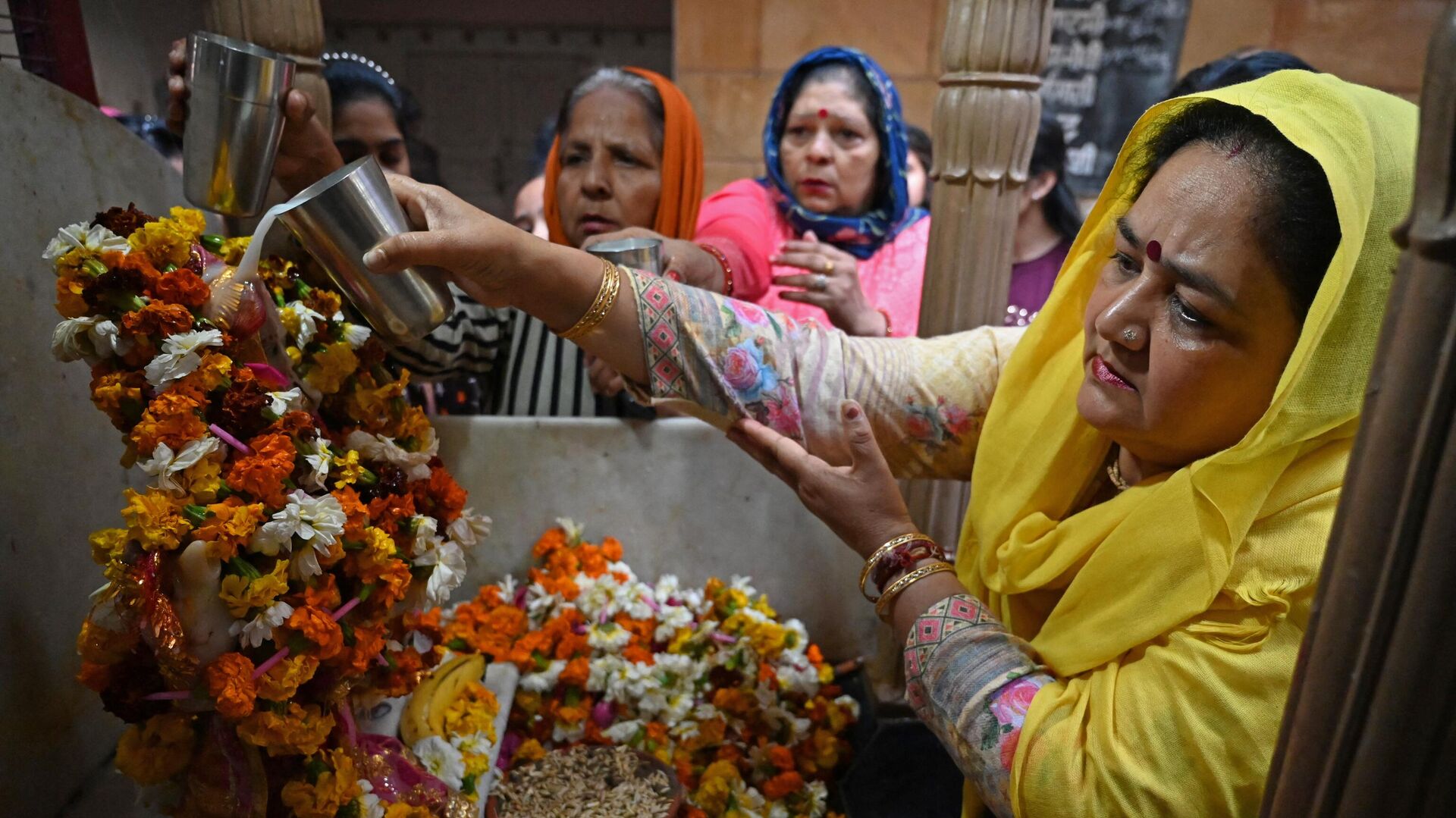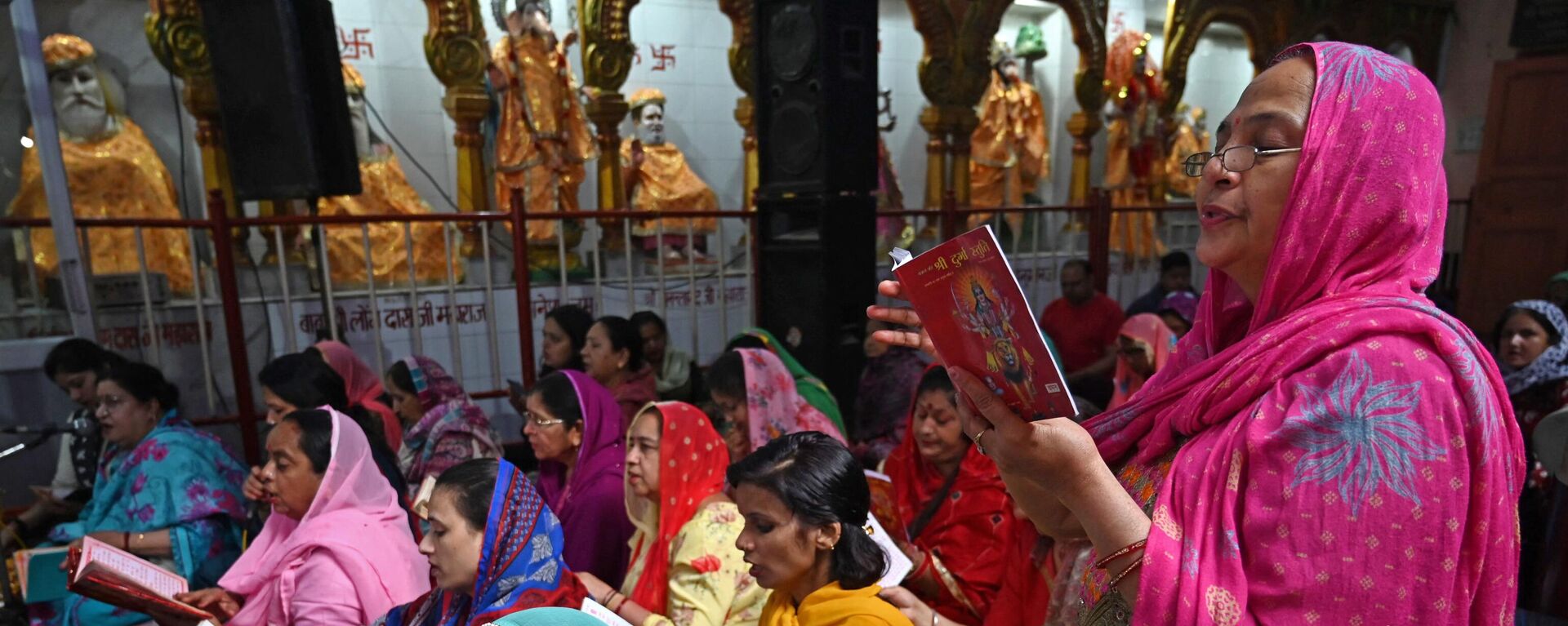https://sputniknews.in/20230819/when-is-navratri-in-2023-3682664.html
When is Navratri in 2023?
When is Navratri in 2023?
Sputnik India
Navratri festival is an awe-inspiring nine-day celebration that includes the grand worshiping of Hindu Goddess Durga and her divine nine incarnations.
2023-08-19T10:00+0530
2023-08-19T10:00+0530
2023-08-19T10:00+0530
india
hindu festival
navratri
hindu goddess kali
food
vegetarian food
amarnath temple
https://cdn1.img.sputniknews.in/img/07e7/08/12/3698987_0:0:3078:1731_1920x0_80_0_0_5764bb48143a82ff958121c45e944332.jpg
The Hindu festival of "Navratri", a Sanskrit word for "nine nights", is about worshiping the nine divine incarnations of the goddess Durga. The occasion signifies the power of womanhood.The festival is celebrated twice a year during the months of Chaitra (March-April) and Sharada (October-November), as per the Hindu almanac. It precedes the “Vijaydashmi” or “Dussehra” festival that marks the victory of Lord Rama over the demon king Ravana.On each day of the festival, devotees worship one incarnation of the goddess. These forms include the goddess Shailaputri, goddess Brahmacharini, goddess Chandraghanta, goddess Kushmanda, goddess Skandamata, goddess Katyayani, goddess Kaalaratri, goddess Mahagauri, and goddess Siddhidatri.When do We Celebrate Navratri in 2023?In 2023, Navratri commences on 15 October and will continue until the Dussehra festival on 24 October. According to the Hindu almanac, the shubh mahurat (auspicious time) to begin Navratri Puja (worship) is at 11:44 am, and ends at 12:30 pm (IST).How is Navratri Celebrated?Navratri is one of the most important festivals, and is celebrated with great pomp and enthusiasm by Hindus across India.Hindu devotees around the world mark the beginning of the Navratri festival by worshiping the goddess Durga at their homes, or visiting temples decked up in the festive spirit.Special Durga Puja pandals (tents) are constructed to worship idols of the goddess Durga, which are a major public attraction on the occasion.Devotees wear traditional Indian garb like a nine-yard saree, kurta pajama, or dhoti kurta, and opt for nine Navratri colors for each day that are said to be the favourite of the goddess in her different forms. Brimming with devotion, people flock to temples to offer prayers to the goddess and offer flowers, sweets, and fruits. Devotees visit Durga Puja pandals hopping and performing the traditional "dhunuchi dance" and folk dances "garba" and "dandiya".Why do People Fast During Navratri?Fasting during Navratri is considered to be auspicious as it is said to be significant for internal physical transformation as it detoxes one's body.Some people observe fasts, called 'Vrat' in Hindi, only on the first and last day of Navratri.However, many faithfully continue fasting throughout the entire festival, abstaining from consuming grains, liquor, and non-vegetarian food. During the fasting period, devotees consume fruits, milk, yogurt, and Navratra special vegetarian delicacies made with rock salt. Some famous Navratri recipes include potatoes, arbi (taro), sabudana (sago) dessert, bread made of kuttu ka atta (buckwheat flour) or singhare ka atta (water chestnut flour).
https://sputniknews.in/20230322/devotees-flock-to-temple-to-worship-goddess-durga-on-first-day-of-navratri-1253122.html
india
amarnath temple
Sputnik India
feedback.hindi@sputniknews.com
+74956456601
MIA „Rossiya Segodnya“
2023
Sangeeta Yadav
https://cdn1.img.sputniknews.in/img/07e6/0c/0f/110602_0:0:641:640_100x100_80_0_0_c298016a79eb02ef8caa9d1f688c12a5.jpg
Sangeeta Yadav
https://cdn1.img.sputniknews.in/img/07e6/0c/0f/110602_0:0:641:640_100x100_80_0_0_c298016a79eb02ef8caa9d1f688c12a5.jpg
News
en_IN
Sputnik India
feedback.hindi@sputniknews.com
+74956456601
MIA „Rossiya Segodnya“
Sputnik India
feedback.hindi@sputniknews.com
+74956456601
MIA „Rossiya Segodnya“
Sangeeta Yadav
https://cdn1.img.sputniknews.in/img/07e6/0c/0f/110602_0:0:641:640_100x100_80_0_0_c298016a79eb02ef8caa9d1f688c12a5.jpg
navratri 2023, navratri, navratri 2023 march, navratri colours, happy navratri, chaitra navratri 2023, navratri 2023 date, navratri march 2023, navratri kab hai, navratri image, navratri colour, navratri wishes, navratri 2023 march date, navratri kab se hai, happy navratri wishes, navratri wishes in hindi, goddess durga, incarnations, vijaydashmi, dussehra festival, lord rama, ravana, why is 'navratri' celebrated?power of womanhood, chaitra navratri, sharada navratre, devotees worship, goddess shailaputri, goddess brahmacharini, goddess chandraghanta, goddess kushmanda, goddess skandamata, goddess katyayani, goddess kaalaratri, goddess mahagauri, goddess siddhidatri, shubh mahurat, how is navratri celebrated?temples, durga puja pandals, worshipping idols of goddess durga, navratri colors, dhunuchi dance, folk dance garba, dandiya, fast during navratri, fasting during navratri, navratra special vegetarian, navratri recipes,
navratri 2023, navratri, navratri 2023 march, navratri colours, happy navratri, chaitra navratri 2023, navratri 2023 date, navratri march 2023, navratri kab hai, navratri image, navratri colour, navratri wishes, navratri 2023 march date, navratri kab se hai, happy navratri wishes, navratri wishes in hindi, goddess durga, incarnations, vijaydashmi, dussehra festival, lord rama, ravana, why is 'navratri' celebrated?power of womanhood, chaitra navratri, sharada navratre, devotees worship, goddess shailaputri, goddess brahmacharini, goddess chandraghanta, goddess kushmanda, goddess skandamata, goddess katyayani, goddess kaalaratri, goddess mahagauri, goddess siddhidatri, shubh mahurat, how is navratri celebrated?temples, durga puja pandals, worshipping idols of goddess durga, navratri colors, dhunuchi dance, folk dance garba, dandiya, fast during navratri, fasting during navratri, navratra special vegetarian, navratri recipes,
The Hindu festival of "Navratri", a Sanskrit word for "nine nights", is about worshiping the nine divine incarnations of the goddess Durga. The occasion signifies the power of womanhood.
The festival is celebrated twice a year during the months of Chaitra (March-April) and Sharada (October-November), as per the Hindu almanac. It precedes the “Vijaydashmi” or “Dussehra” festival that marks the victory of Lord Rama over the demon king Ravana.
On each day of the festival,
devotees worship one
incarnation of the goddess.
These forms include the goddess Shailaputri, goddess Brahmacharini, goddess Chandraghanta, goddess Kushmanda, goddess Skandamata, goddess Katyayani, goddess Kaalaratri, goddess Mahagauri, and goddess Siddhidatri.
When do We Celebrate Navratri in 2023?
In 2023, Navratri commences on 15 October and will continue until the Dussehra festival on 24 October.
According to the Hindu almanac, the shubh mahurat (auspicious time) to begin Navratri Puja (worship) is at 11:44 am, and ends at 12:30 pm (IST).
How is Navratri Celebrated?
Navratri is one of the most important festivals, and is
celebrated with great pomp and enthusiasm by Hindus across India.
Hindu devotees around the world mark the beginning of the Navratri festival by worshiping the goddess Durga at their homes, or visiting temples decked up in the festive spirit.
Special Durga Puja pandals (tents) are constructed to worship idols of the goddess Durga, which are a major public attraction on the occasion.
Devotees wear traditional Indian garb like a nine-yard saree, kurta pajama, or dhoti kurta, and opt for nine Navratri colors for each day that are said to be the favourite of the goddess in her different forms.
Brimming with devotion, people flock to temples to offer prayers to the goddess and offer flowers, sweets, and fruits.
Devotees visit Durga Puja pandals hopping and performing the traditional "dhunuchi dance" and folk dances "garba" and "dandiya".
Why do People Fast During Navratri?
Fasting during Navratri is considered to be auspicious as it is said to be significant for internal physical transformation as it detoxes one's body.
Some
people observe fasts, called 'Vrat' in Hindi, only on the first and last day of Navratri.
However, many faithfully continue fasting throughout the entire festival, abstaining from consuming grains, liquor, and non-vegetarian food.
During the fasting period, devotees consume fruits, milk, yogurt, and Navratra special vegetarian delicacies made with rock salt.
Some famous Navratri recipes include potatoes, arbi (taro), sabudana (sago) dessert, bread made of kuttu ka atta (buckwheat flour) or singhare ka atta (water chestnut flour).



